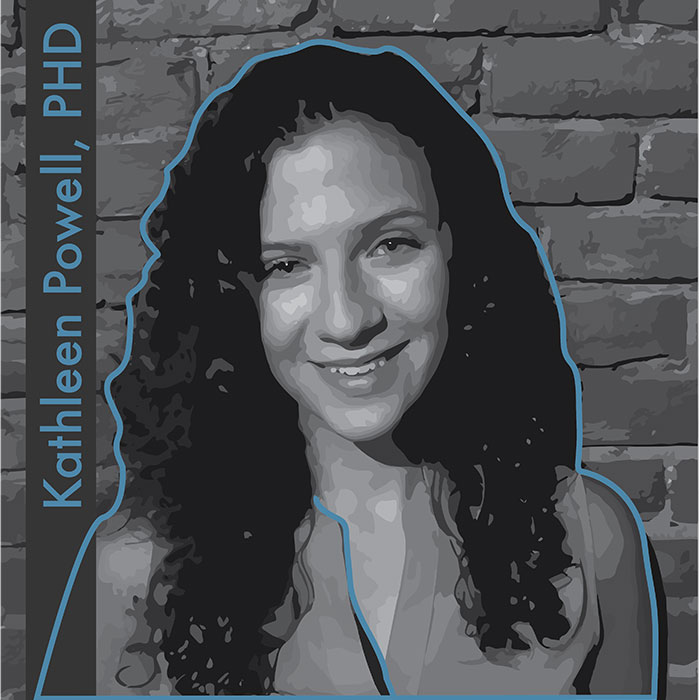Four CoAS Projects Funded in Support of Racial Equity
October 28, 2020
This summer, Drexel University’s Office of Research and Innovation funded projects by 22 faculty and staff across the university from its Rapid Response Research and Development Fund, which was designated for urgent action, short-term projects focused on racial equity. Learn more about the funded projects out of the College of Arts and Sciences, and how the researchers are tackling issues from bystandership among police officers to inclusive teaching practices.

Kathleen Powell, PhD
Project: “Examining Racial Differences in the Link between School Suspensions and Arrests”
Investigator: Kathleen Powell, PhD, postdoctoral fellow in criminology and justice studies
Project Description: Youths’ and adolescents’ involvement with the justice system is correlated with numerous harmful outcomes, including an increased risk of high school noncompletion, fewer employment prospects, and worsened mental and physical health. Because racial and ethnic minority youth are overrepresented at all points in the juvenile (and criminal) justice process, the risk of these harms is concentrated among youth from these communities.
In this project, Powell will examine exclusionary school discipline as one possible factor contributing to these racial and ethnic disparities. Students of color disproportionately receive such discipline actions, including suspension and expulsion. Because suspended youth are at an increased risk of being arrested, these policies may partially explain racial and ethnic inequalities in the justice system.
Outcomes: Findings from this research will reveal possible racial and/or ethnic differences in the link between suspensions and arrests, and may highlight the role of suspensions as a driver of inequality in system involvement. Results carry implications for policy reforms directed at reducing disparate exposure to the justice system and associated adverse social outcomes.
“It is important to understand the process through which youth and adolescents — particularly Black youth and adolescents — contact the justice system, because so much research shows that being arrested or detained is harmful to prosocial development in many ways,” says Powell. “In this project, I hope to illuminate how the scope and concentration of school suspensions among racial and ethnic minority youth may drive disparities in system involvement and, in turn, potentially exacerbate social inequalities by disadvantaging these individuals well into adulthood.”

Jennifer Stanford, PhD & Jason Silverman, PhD
Project: “CASTLE Diversity, Equity and Inclusion Faculty Fellow”
Investigator: Jennifer Stanford, PhD, associate professor of biology and co-director of CASTLE (Principal Investigator), and Jason Silverman, PhD, professor of education (Co-PI)
Project Description: Currently, there are far fewer underrepresented minority individuals working and learning in STEM fields than are present in the U.S. population. Curricular change has been identified as a primary driver to increase diversity in undergraduate STEM fields, and thus is a way to address systemic racism in STEM education. Pedagogies that foster active and collaborative learning can inclusively enhance student learning and persistence in STEM educational paths.
It is known that supporting change agents who have knowledge in STEM fields can allow them to lead in encouraging others to reflect and challenge their beliefs on teaching and learning towards pedagogical change. The Center for the Advancement of STEM Teaching and Learning (CASTLE) has recently established a Faculty Fellows program, with support from the Howard Hughes Medical Institute, to foster the development of these change agents who have disciplinary expertise in a STEM field. Through this grant, CASTLE will expand the Faculty Fellows program by hiring a Fellow whose role is to focus on diversity, equity and inclusion in STEM undergraduate courses.
Outcomes: The Diversity, Equity, and Inclusion Faculty Fellow will affect learning and teaching at Drexel through providing just-in-time responses to faculty questions, developing CASTLE community events, and creating resources for the larger Drexel community and beyond. Importantly, this work is intended to serve as a pilot project for a larger bottom-up, peer-supported, diversity initiative.
“It is expected that in this role, the Faculty Fellow will raise awareness of inclusive teaching practices and develop resources to help faculty in learning about and implementing inclusive pedagogies,” says Stanford. “It is our hope that through this effort, we will contribute to needed change to promote diversity equity, and inclusion in undergraduate STEM disciplines at Drexel.”

Jason Orne, PhD & Caroline Voyles
Project: “Policing & Health: The Effects of Law Enforcement Encounters Among Queer People of Color”
Investigators: Jason Orne, PhD, assistant professor of sociology (Principal Investigator), and Caroline Voyles, PhD candidate in community health and prevention (Co-PI)
Project description: “The first pride was a riot,” recent marchers chanted at the Queer and Trans Black Lives Matter protest in Philadelphia. This project aims to unravel this longstanding connection between policing and queer people of color (QPOC) — demonstrating the health consequences of police oppression for this population — as a pilot study for an NIH proposal to examine potential barriers and protective factors that could alleviate this disparity.
Addressing the systemic racism within law enforcement activities within the United States should include an intersectional lens, as policing is not discriminatory solely on the facet of race. Indeed, racial/ethnic minorities who have additional marginalized identities may experience more frequent or negative police encounters, or be more greatly impacted by these events.
Outcomes: This research effort will examine the longitudinal health impacts of police encounters for QPOC, a marginalized group that is greatly affected by systemic racism and heterosexism. The proposed study is a quantitative secondary data analysis of the National Longitudinal Study for Adolescent Health, which has collected self-reported data from a nationally representative sample in four waves since 1994.
“We’re really excited about this project,” says Orne. “After the protests in Philadelphia, we dedicated a seminar in the Urban Sexualities Lab to Black Feminism, one of the foundations of my theory of carnality. As a lab, the students pressed for how we could be doing more direct work to improve Black lives. We hope that understanding the intersectional experience of queer people of color with policing can be the first step toward policy change and, hopefully, an NIH grant to develop positive interventions to reduce the health influence of policing on QPOC.”

Robert Kane, PhD
Project: “A Simulation-Based Peer Intervention Training Program to Increase Active Bystandership Among a Sample of Police Officers”
Investigators: Robert Kane, PhD, department head of criminology and justice studies, and Anne-Marie O'Brien, PhD, School of Nursing, The George Washington University. Crystel Farina, also of GW’s School of Nursing, is the Situation Interventionist.
Project Description: This pilot study was designed to develop and test a police officer peer intervention training program using the same simulation pedagogy as in the disciplines of academic nursing and medicine. Simulation pedagogy immerses students in a disorienting, hypothetical clinical situation requiring immediate application of knowledge, attitudes and behaviors to resolve the encounter. The simulations are designed to be challenging enough to demand “authenticity” of performance, but of low enough stakes that students are allowed to make mistakes without serious consequence.
The team plans to run a randomized controlled trial in which half of our study officers, following a simulated use-of-force encounter, will participate in a simulation debrief. The debrief, run by a Simulation Interventionist, will encourage officers to identify where they made mistakes during the encounter, where they could have intervened, how they might recognize the signs that a colleague is losing control, and how to develop a script to confidently intervene during future encounters. After the debrief, officers will participate in a second simulated, potentially violent encounter.
Control-group officers will go through the same simulations, but will read literature on workplace violence in lieu of the debrief treatment. Several veteran police officers will act as standardized participants during the simulated scenarios. These officers — in conjunction with other actors playing various roles — will use the same escalation-of-force tactics and training as in police academy settings.
Outcomes: “We’re hoping that an evidence-based, police officer peer-intervention program can help break the subcultural norm that encourages officers to remain passive when their colleagues engage in problematic field behaviors. Through simulation pedagogy and its debrief process, an active bystandership norm can be developed by officers at the street-level, which can filter up through the organization and ultimately make its way into policy and training. This is the opposite of how police department policies are usually created — i.e., from the top-down. This bottom-up approach gives officers ownership of the active bystander norm, which should lead to buy-in among officers throughout the organization.”